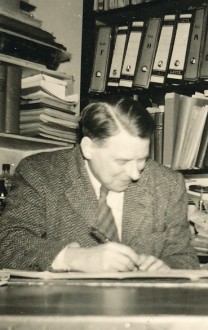Hans Findeisen was born in Berlin in 1903. He spent his childhood and youth in his home town. Findeisen developed an early interest in anthropological matters.
After finishing school Findeisen took up his studies, which he completed in 1927. Between 1922 and 1934 he also worked as a scientific assistant at the Berlin Ethnological Museum (formerly: Staatliches Museum für Völkerkunde). Moreover, Findeisen did field researches in Northern Siberia and the Caucasus region between 1927 and the early 1930s. He not only collected ethnographic data but also recorded oral culture such as fairy tales and songs.
In 1934 Findeisen became a member of the Nazi party NSDAP and its paramilitary organization SS. From 1934 until 1941 he lectured at the Seminar for Oriental Languages of the Friedrich-Wilhelm University (now: Humboldt-University) in Berlin. Moreover, Findeisen held an assistant position at the Institute for Cultural Morphology (now: Frobenius-Institute) in Frankfurt/Main in 19387/38.
After World War II Findeisen was founder of the “Institut für Menschen- und Menschheitskunde“ in Augsburg in 1948. Throughout the years his regional focus lay mainly on Northern and Central Asia while his special interest was concerned with shamanism and religion but also language and history.
Hans Findeisen died in Neuwied in 1968.
(Text written by Vincenz Kokot in July 2012, based on an article at wikipedia.de and an article by Dr. Gerd Simon, 1996/2010: http://homepages.uni-tuebingen.de/gerd.simon/EuroFindeisen.pdf; photo shows Findeisen in 1952, by courtesy of Ulla Johansen)
Short Portrait: Hans Findeisen

Hans Findeisen
 further information
further information

